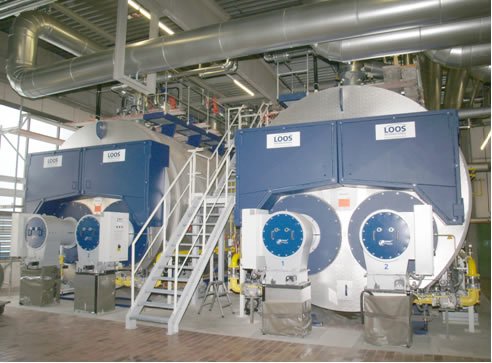The Mercedes-Benz plant in Kassel manufactures axles and axle systems for trucks, vans and trailers, plus drive shafts and car components. With its strong brands, innovative products and ultra-modern production and process engineering systems, Daimler sees itself as a premium manufacturer in the motor industry. All its production phases are designed to be as environmentally friendly as possible. The most important areas of activity are climate protection, the prevention of air pollution and the rational use of resources. To achieve this, Daimler developed control processes which are laid down in certified environmental management systems at the various sites.
The Kassel plant was to be made independent of the existing district heating supply in accordance with these strict environmental guidelines. In addition to the warmth needed to heat the halls and buildings, process heat was also required to heat the containers in which the machine parts are washed. The plant itself was responsible for planning the independent, environmentally friendly power supply system. This meant that the demands laid down by the premium manufacturer in its call to tender were extremely tough. Fuel consumption and noise and pollutant emissions were to be reduced as far as was technically possible. The contract was awarded to the famous plant construction firm of Imtech. Two touchscreen-controlled high-pressure double-flue boilers in the LOOS UNIVERSAL UT-HZ series, with integrated flue gas heat exchangers, fuel supply modules and low-emission dual burners, were brought in, installed and handed over ready for use by the Imtech branch in Kassel. Expert additional work relating to the innovative boiler technology was provided by the LOOS Mitte branch based in Frankfurt.
The total installed heating capacity of nearly 40 MW will only be used during rare peak periods, as is normal for heating applications. Generally, the systems will work in partial load ranges, which means that the unlimited single-flue operation of the boiler systems is particularly worthy of attention. The adjustment ranges can be doubled, as a consequence, and the switching on and off of burners, with the associated energy losses from preliminary venting, can be considerably reduced. Speed-controlled fans minimise the use of electrical energy whilst also reducing noise emissions. Modern, oxygen-regulated burners keep the air surplus down across the complete load range, which has a positive effect on annual usage, the use of fuel and pollutant emissions.


